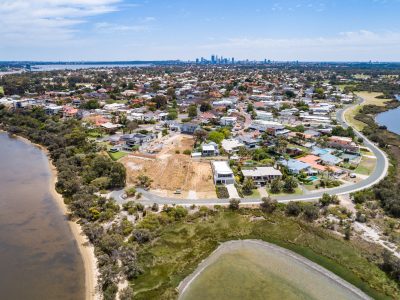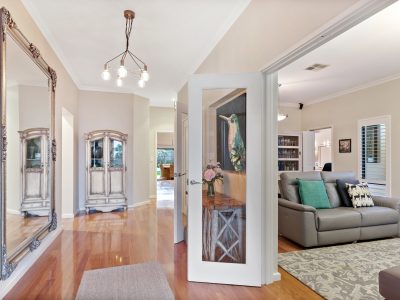Real estate agent Debbie Donnelley‘s children learnt from a very early age that when their mum’s phone rang in the car, they had to be quiet. It was usually a work call and, even in the middle of an afternoon school pick-up run, she’d always have to take it.
“I was a single mum, so it could be very difficult as real estate is a six-day-a-week job,” she says. “For women in the industry, unless you have a house-husband or house-partner or a nanny, baby-sitter and driver, then juggling everything can always be tough.”
In the run-up to International Women’s Day on March 8, with this year’s theme Balance for Better, the latest Workplace Gender Equality Agency statistics show that women do indeed often receive a rough deal.

Debbie Donnelley
The gender pay gap between men and women working in real estate services sat at a massive 24.1 per cent in May last year – the third-biggest gap of all industries – which actually widened one per cent over the year before. That contrasts markedly with the all-industries national full-time working pay gap of 14.6 per cent, where women earn an average of $1,433.60 a week, and men $244.80 more at $1,678.40.
Donnelley, who is a partner of Phillips Pantzer Donnelley in Sydney, says many women have tried, and a few have succeeded. “The industry has always been a boys’ club and Di Jonessmashed through that ceiling with an all-female agency, and others followed under her umbrella,” she says.
“But some difficulties will always be there. For mothers, you still have to turn up if a client wants to see you at 7pm rather than being with your kids when they’re doing their homework, and you can’t get to watch them at sport on a Saturday. But it can be a great career for women, as long as you have a big support network.”
Women’s participation in different facets of the industry is quite diverse, with the majority of property management agents being female, for example, and a rising number of female sales agents, but there are real shortfalls in the number of female principals of firms.
“We also have very few women auctioneers,” says Antonia Mercorella, the CEO of the Real Estate Institute of Queensland (REIQ). “We run an annual auctioneers’ competition and it’s rare to see a female participating.

Antonia Mercorella
“In other areas, like the commercial real estate space, there aren’t many women either, although we do have some terrific women coming up.”
In order to help close the gender gap, the REIQ has now reserved two positions on the six-member-director board for women, has an annual event around women in real estate celebrating their achievements, and dedicate an edition of their monthly publication to women. They’re also considering introducing auctioneer workshops to encourage women into that field.
In NSW, REINSW president and Laing+Simmons managing director Leanne Pilkington says there’s also a real need for more data about gender in the industry to take more effective action, and there are moves around research to obtain that. On the plus side, many companies are becoming more flexible about their hours to help women agents who have responsibilities for children.

Leanne Pilkington
“But one of the problems we know is that a lot of salaries and commission splits in the industry are decided through negotiation, which often men seem more comfortable with,” she says. “I read a US study that found that of new university graduates, 57 per cent of the boys negotiated their first salary, as against just 7 per cent of women.
“So I think it’s more about educating women about how to have those conversations and how to talk about career progression and about knowing their own worth. We’ve got to be able to understand, and demonstrate, our value to a business.”
Clinton Baxter, Victorian state director of CBD and metropolitan sales for Savills Australia, says gender inequality in the real estate industry is something he’s found extremely frustrating over the years.

Clinton Baxter
“The industry has a long history of ‘blokey’, ‘matey’ and sexist culture that has served to actively discourage many of the most talented and capable females from participating or advancing their careers in the industry,” he says. “It remains rare within the industry for the most senior positions of real estate firms to be occupied by women, and it is this discriminatory culture that is still holding it back
“Accordingly, I see the problem fundamentally as an opportunity gap more so than a pay gap, because in many instances women have not been encouraged by the work and industry environment to be ambitious, or invited to advance their careers in such workplaces. Often the environment has been such to actively repel highly capable and ambitious women from the industry.”
The residential real estate market is slowly advancing, he believes, but the commercial sector still has a long way to go. Initiatives such as 500 Women in Property and Property Male Champions of Change are going some way to shine a spotlight on the issue, but the pace of change is slow.
“It is inevitable that the real estate industry will change and progress – the value, capability and input of women for clients and companies alike is far too great to ignore,” he says. “And I’d encourage all women seeking to advance in the real estate industry to strive, persist and be ambitious. The industry need high performing females to help close the gap.”
Sourced via https://www.domain.com.au/group/agent-news/iwd-2019-what-we-can-change-in-the-industry-to-achieve-gender-balanceforbetter/?utm_source=agent-wrap&utm_campaign=t-all-agent-wrap



